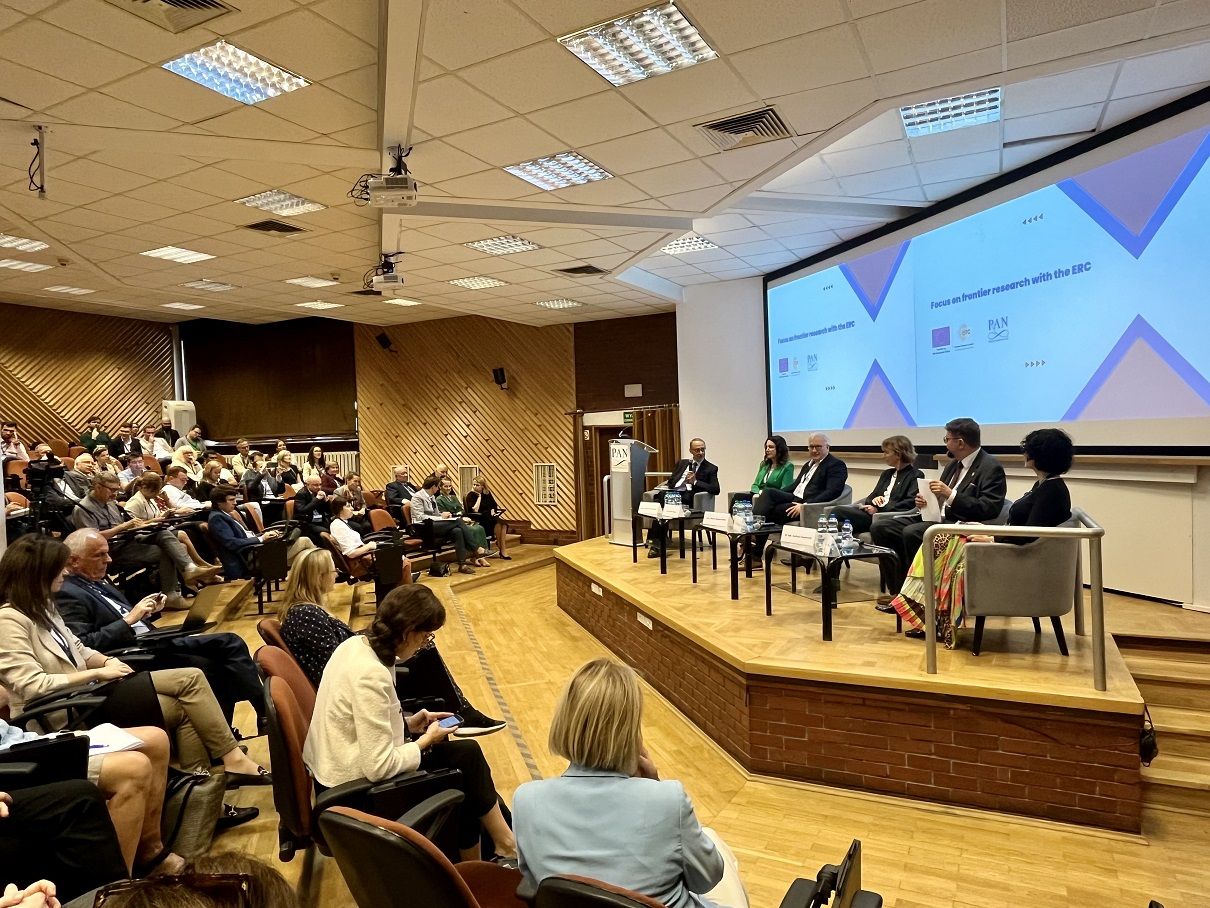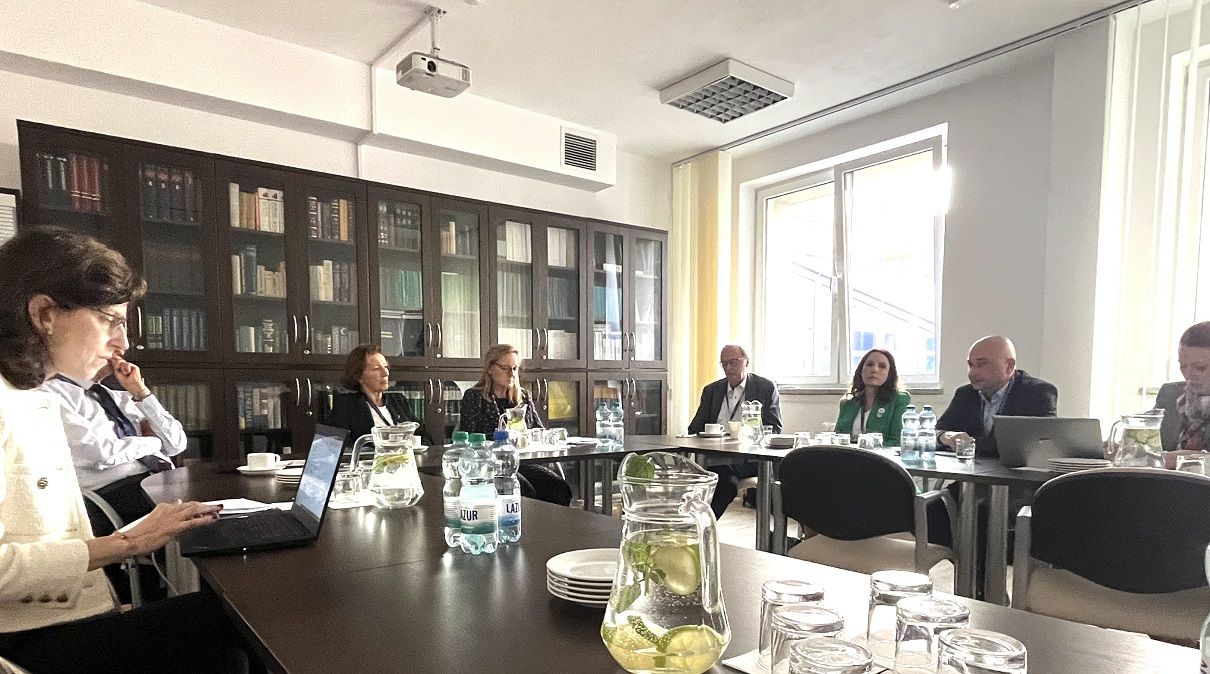“Poland has what it takes to become a future leader in technology and innovation, but it must invest in research”, said Prof. Maria Leptin, President of the ERC, at a conference with NCN representatives, which took place in Warsaw on 24 September.
History shows that basic research, i.e. research fuelled by a natural thirst for knowledge, rather than any potential practical application, is the most important source of invention and innovation. We would never have fibre-optic networks, novel materials or COVID vaccines today without prior long-term investment in basic research. At a meeting in Warsaw, Prof. Maria Leptin said that one of her top goals as the President of the European Research Council is to get the ERC budget doubled under EU’s 10th Framework Programme, so that the agency can fund many more research projects than it has until now. She has cited, e.g. the official statement that the ERC Scientific Board has published earlier this year:
 Panel dyskusyjny: Key role of frontiers research in addressing global challenges of modern world
Leptin also emphasised that EU funding can never replace domestic funding; only domestic investment in research and a good research policy can turn a country into a real leader in technology and innovation. “Creating robust conditions for research growth cannot be the role of a single ministry, it needs to be the job of an entire government”, she stressed. She quoted the example of countries like Switzerland, the Netherlands, Belgium or Germany, which have invested huge amounts in research for years, to argue that, for basic research, it often takes years before the effects can be seen. “Countries that lead the fray in research today do so only because of the investments they made in the past”, she said.
Panel dyskusyjny: Key role of frontiers research in addressing global challenges of modern world
Leptin also emphasised that EU funding can never replace domestic funding; only domestic investment in research and a good research policy can turn a country into a real leader in technology and innovation. “Creating robust conditions for research growth cannot be the role of a single ministry, it needs to be the job of an entire government”, she stressed. She quoted the example of countries like Switzerland, the Netherlands, Belgium or Germany, which have invested huge amounts in research for years, to argue that, for basic research, it often takes years before the effects can be seen. “Countries that lead the fray in research today do so only because of the investments they made in the past”, she said.
NCN before ERC
Scientists affiliated with Polish research centres have carried out a total of 87 ERC-funded grants. Most have previously worked on projects funded by the National Science Centre and report that their experience in heading an NCN-funded project has crucially contributed to their success at the ERC, allowing them to start out on their independent research paths, develop research skills and gain experience in independent research and research team management.
Professor Maria Leptin emphasised that the success rate of Polish researchers taking part in ERC calls has grown from 2 to 7% since the 7th Framework Programme. However, that number is still well below expectations. At the conference in Warsaw, attendees discussed how it could be increased. “Without funding for basic research, we won’t be able to make a contribution to world science. At the current level of funding available to the NCN, we can’t even begin to think of new initiatives to increase the participation of our researchers in the international arena”, lamented Prof. Anetta Undas, President of the NCN Council. Her words were echoed by the president of the Polish Academy of Sciences. “Unless the NCN’s budget is increased to 2 billion zlotys and its success rates climb to 25%, we can forget about more ERC grants”, said Prof. Marek Konarzewski.
“This debate has been going on for more than 10 years now and the outcomes are still far from what we would expect”, said Prof. Justyna Olko from the University of Warsaw, former NCN Council member (2018-2022) and winner of two ERC grants. “The main challenge is that there is no clear system-level support for excellence in Polish research policy”, she said. She also pointed out that NCN funding must be increased if we want to enable researchers to maintain their research continuity; unless the success rates in NCN calls is increased, Polish success rates in ERC calls won’t budge either.
The meeting with the President of the European Research Council, “Focus on Frontier Research with ERC”, was organised by the Polish Academy of Sciences and the ERC. The agenda of the event also included workshops for researchers interested in applying for ERC grants.
 Spotkanie z Marią Leptin
Spotkanie z Marią Leptin
During the conference, the President of the ERC also held a private meeting with NCN representatives. Prof. Krzysztof Jóźwiak, NCN Director, and Prof. Anetta Undas, President of the NCN Council, emphasised that the NCN has been directly modelled on the European Research Council. Both institutions are run by scientists and have a similar structures and programmes. The participants in the meeting discussed possible support mechanisms for Polish researchers applying for ERC grants and the expectations of Poland under EU’s 10th Framework Programme. NCN representatives pointed out that a key step toward boosting research outcomes in our country would be to create more centres of excellence similar to those established under the Dioscuri programme, a joint initiative of the Max Planck Society and the NCN.
